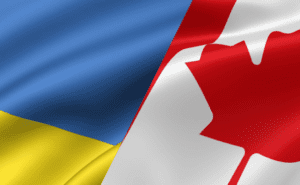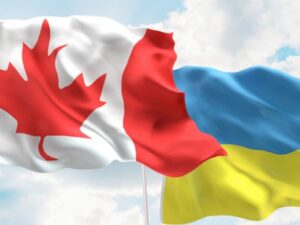
Ukraine and Canada will return to work on expanding the Free Trade Agreement (FTA) and complete work on it in the coming weeks, the Ministry of Economy announced following an online meeting between First Deputy Prime Minister of Economy Yulia Svyrydenko and Minister of International Trade, Export Promotion and Small Business Canada Mary Ng.
“During the negotiations, government representatives decided to return to work on expanding the FTA Agreement between Ukraine and Canada and complete developments over the coming weeks,” the ministry said on its website on Sunday.
According to Svyrydenko, Ukraine is counting on Canada’s support in overcoming the food crisis provoked by the blocking of Ukrainian exports through seaports.
She said that an important step towards Ukraine could be the abolition of trade duties on Ukrainian goods by Canada following the EU and the UK.
“This will help exporters increase the volume of exports of products and thereby strengthen the Ukrainian economy and the defense of our state,” Svyrydenko was quoted as saying in the press release of the ministry.

Canada has decided to allocate $1.5 billion to Ukraine for the year and the country has already received $0.5 billion, President of Ukraine Volodymyr Zelensky said at a press conference in Kyiv after talks with Canadian Prime Minister Justin Trudeau.
“Money is also a weapon. Canada today decided to allocate 1.5 billion for the year and we have already received 0.5 billion. This is powerful help. Canada is second only to the US in terms of aid,” he said.
At the same time, Zelensky again focused on support with weapons. “We lack heavy weapons. We all know perfectly well which powers have the technical capability, where peace reigns, weapons are not used, which powers can transfer these weapons to us,” he said.

Canada, following the UK and the EU, is canceling all duties on imports of goods from Ukraine, Canadian Prime Minister Justin Trudeau announced after meeting with President Volodymyr Zelensky in Kyiv on Sunday.
“This is a good continuation of the initiative of the EU and Britain, which confirms the interest of developed countries to involve the Ukrainian economy in their own industrial and trade chains,” Yulia Sviridenko, First Deputy Prime Minister and Minister of Economy, commented on this decision.
She recalled that on the eve of this meeting, she also discussed with Canadian Minister of International Trade Mary Angie the whole range of economic cooperation measures that both countries intend to implement.
“For our ministry and Ambassador to Canada Yulia Kovaliv, this is an ambitious work program for this year,” Sviridenko stressed.

Canadian Foreign Affairs Minister Mélanie Joly has said the federal government of Canada will change its sanctions law to allow seized and sanctioned foreign assets to be redistributed as compensation to victims or to help in rebuilding a foreign state from war, the Canadian Broadcasting Corporation (CBC) has reported.
“Today, we are seeking the capacity to not only seize but to allow for the forfeiture of the assets of sanctioned individuals and entities and to allow us to compensate victims with the proceeds… These changes would make Canada’s sanctions regime the first in the G7 to allow these actions,” Joly said in a statement on Tuesday.
The CBC said that Canada is among a number of countries to have imposed sanctions on Russia after it invaded Ukraine on February 24. The changes that Canada aims to bring to its sanctions law will mean that funds or property seized from Russia could be paid out to help rebuild Ukraine or go to those affected by Russia’s invasion.
The text of the bill says the seized assets can be used for “the reconstruction of the foreign state adversely affected by a grave breach of international peace and security.” The funds could also be used for “the restoration of international peace and security” and to compensate victims when that security is breached.
A similar bill that would allow Canada to seize and confiscate Russian assets for the purpose of supporting victims of Russian attacks was already tabled by Sen. Ratna Omidvar and is poised to be approved by the upper chamber.
According to the CBC, the Ukrainian Embassy to Canada has urged lawmakers to quickly enact Omidvar’s bill. “We believe it is absolutely fair that Russian state property or ill-gotten assets of Russian oligarchs must become a part of reparations by the aggressor state to the victim of the aggression… By passing the Bill S-217 Canada will demonstrate leadership and could set an example for others to follow and show that the Russian kleptocratic corrupt regime will pay the full cost of its crimes against Ukraine,” the embassy said in a statement.

Germany will send 50 Gepard anti-aircraft systems to Ukraine, Canada 8 armored vehicles, Britain additional anti-aircraft systems, US Secretary of Defense Lloyd Austin said.
“I want to especially welcome Germany’s significant decision as Minister Lambrecht announced today that Germany will send 50 Gepard anti-aircraft systems to Ukraine. Yesterday, the British government announced that it would also provide additional anti-aircraft systems to Ukraine. Canada today announced that it would send 8 armored vehicles to Ukraine. This is important progress, we see more every day,” Austin said at a press conference following a meeting of defense ministers from more than 40 countries regarding Ukraine’s current and future defense needs at Ramstein Air Base in Germany on Tuesday.

Canada’s draft federal budget for 2022 (starts July 1), presented by Deputy Prime Minister Chrystia Freeland in Parliament on Thursday, provides for the continuation of active financial support for Ukraine, in particular, the allocation of CAD500 million (almost $400 million) of military assistance and CAD1 billion (almost $800 million) loans.
“Canadians support the brave people of Ukraine, who are fighting for their lives, for their sovereignty, for their own and for our own democracy,” reads the preamble to a separate “Support for Ukraine” section of the budget, posted on the Canadian Treasury website.
According to him, at the beginning of this year, Canada announced the expansion of Operation UNIFIER, the mission of the Canadian armed forces to provide military training and support to Ukrainian forces, under which since 2015 Canada has trained about 33,000 Ukrainian military and security forces, as well as the provision of military assistance to over CAD90 million
“The 2022 budget proposes to allocate an additional CAD500 million in 2022-2023 to provide additional military assistance to Ukraine,” the draft reads.
It clarifies that Canada is already providing military assistance, both lethal and non-lethal, and is also partnering with allies to share intelligence and provide support in enhancing Ukraine’s cybersecurity.
With regard to sanctions and holding Russia accountable, the draft 2022 budget announced the government’s intention to clarify the powers of the Minister of Foreign Affairs to confiscate and dispose of assets belonging to individuals and entities under sanctions.
The document states that to date, Canada has provided CAD145 million in humanitarian assistance and CAD35 million in development assistance to provide direct support to Ukrainians affected by the illegal Russian invasion, as well as loans totaling CAD620 million to support Ukraine’s financial stability, economic sustainability and governance reforms.
“The 2022 budget announced that Canada will offer up to CAD1 billion in new credit resources to the government of Ukraine through a new managed account for Ukraine at the International Monetary Fund (IMF) so that the government can continue its activities,” the draft reads.
It clarifies that Canada has worked with the government of Ukraine, the IMF and other member countries to establish this mechanism and encourage allies and partners to participate.
In addition, Canada recalled that since March 17, it has given permission to Ukrainian refugees and their closest relatives of any nationality to stay in Canada as temporary residents for up to three years with the right to work. They will also have access to additional support such as language training and career guidance services.
The federal government is also developing a special permanent residence program for Ukrainians with relatives in Canada.
“The government has provided new funding of CAD111 million over five years with CAD6 million in subsequent years to implement these new immigration measures,” the draft states, including CAD78 million for this purpose in the draft 2022 budget.